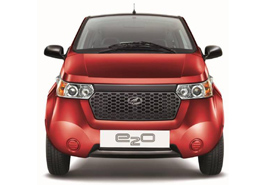New Indian-made electric car to hit the roads
NEW DELHI—Top Indian utility vehicle maker M&M on Monday launched the most advanced home-grown electric car yet seen, pricing it at $11,000 and saying it hopes to sell the hatchback abroad next year.
The four-seater, two-door e2o—pronounced “ee-too-oh”—has zero emissions, an 80 kmh (50 mph) top speed, is automatic and can run for 100 kilometers on a single charge.
The new car boasts 10 onboard computers analyzing core functions and sending alerts if anything needs fixing—a feature usually found in costlier cars—and can be fully charged in five hours from a 15A power socket.
“This is our vision of the future of mobility,” M&M chairman Anand Mahindra told reporters in New Delhi.
“We need to make a clean energy future,” he said, warning that the nation of 1.2 billion people “is at a tipping point” with vehicle emissions increasingly blamed for respiratory and other illnesses and environmental problems.
Article continues after this advertisement“Eco-friendly transport (is) the need of the hour,” he said, with M&M targeting affluent families wanting a car for city jaunts or as a second vehicle. It is looking at selling the car abroad starting next year in Europe and Africa.
Article continues after this advertisementThe car is the fruit of the $16 billion M&M group’s 2010 purchase of a controlling stake in Indian electric vehicle maker Reva, pioneered by engineer Chetan Maini, as part of a green technology drive.
Maini, who stayed with the firm, told AFP the hatchback was a “game-changing” vehicle compared to the tiny, boxy two-seater Reva, derided by critics as a “golf cart.”
The Reva, known as the G-Wiz in Britain, ended production in 2012 after selling fewer than 5,000 units globally over a decade, with buyers reluctant to pay a premium price for a tiny car.
While the e2o, priced at 596,000 rupees ($11,000), is as much as 300,000 rupees dearer than petrol hatchbacks of a similar size, M&M said fuel savings could total 70,000 rupees annually. The car can also be charged under a solar canopy, saving on energy costs.
The vehicle, to be manufactured at a 30,000-unit-capacity plant in Bangalore, has no oil filters, spark plugs or radiators, reducing maintenance costs.
“It’s a quantum leap from the Reva, but it’s costly, and we don’t have a sufficient pan-India charging network yet. People may not find it practical,” Hormazd Sorabjee, editor of leading car magazine Autocar India, told AFP.
Energy-hungry India’s endemic power outages have also sparked concerns that owners might not be able to re-charge batteries at home when needed.
M&M is banking on India’s government following through with an ambitious $4 billion plan to support an electric vehicle network aimed at having six million electric vehicles on the road by 2020.
A senior company executive said Mahindra Reva would “be happy” to initially sell 400 to 500 cars a month.—Penny MacRae
